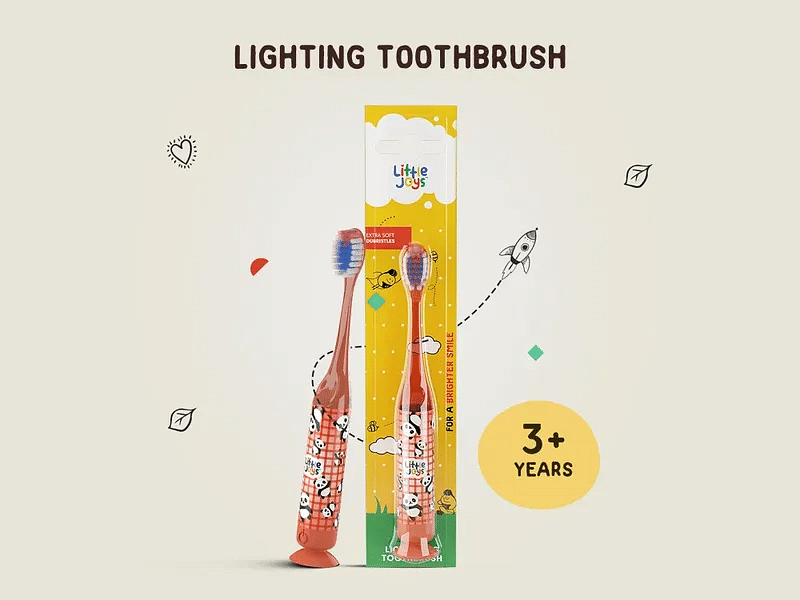20 Moral Values for Kids That You Should Teach Them At An Early Stage
Moral values directly contribute towards making your child a better individual. Read about the different moral values for children that can help shape their future.

What Are Moral Values?
Moral values help a person make day-to-day choices and influence their ability to decide between right and wrong. The inculcation of moral values helps individuals decide between good and bad and guide them in becoming upstanding people. These values also help children foster daily relationships and encourage them to build honest relations.
Moral values can be behavioural practices, daily habits, or goals built around our society. They can be called the critical component of an individual's character and influence a child’s personality trait as they grow up. These values can be derived from society, family, or government. Moral values are essential in every stage of life and remain with the child when they grow older.
Adults tend to believe in the same moral values that they were taught as children. These values can guide a child and help them decide what kind of individual they want to be. A child's parents, school, friends, and social environment give them the correct moral values.
Importance of Moral Values
Childhood is an impressionable age. A child goes through several stages while growing up and is exposed to different kinds of environments. When they leave the protection of their house and parents, a child is introduced to new challenges and changes. This leads to their evolution and growth. Children tend to learn and pick up on different lessons that stay with them as they become adults during this growth.
Moral values help the child through this stage and develop a personality. The right moral values encourage a child to become more accountable, responsible and honest. It also allows them to make the right decisions despite facing difficult circumstances.
The right moral values help build a solid character, but it also helps them understand the difference between right and wrong. When children are taught the correct moral values, they always have a standard to fall back onto when faced with new circumstances. Hence, moral values guide different stages of a child’s life and greatly influence their personality. Adults without moral values can become a threat to society and themselves.
Moral Values for Kids
1. Respect
Parents often tend to teach their kids the importance of respecting their elders. However, that is not enough. Children should be taught to respect everyone, including their elders. It is crucial to learn that everyone deserves respect, be it friends or household help. The moral value of respecting others is an important pillar in a child’s life and influences their daily behaviours. Kids can learn about respect from their parents and peers. The concept of respect allows a child to be kind and solicitous of others even when faced with challenging situations.
2. Family
Family plays an integral role in a young kid's life. A close-knit family shapes a child’s values and helps them mould into good adults. It is vital to provide your child with the essence of a family and help them understand the bond and love shared within the family. Doing so will increase the likelihood of your child growing up respecting and staying by their family through the good and bad times.

ProteinMix Powder
Are you looking for a way to support your kids' growth and development? Little Joys has got you covered with our ProteinMix Powder - the ultimate ragi & bajra blend designed to promote healthy growth and brain function!
🌾 2x more protein
🛡️ Boosts immunity with superfoods like ragi and bajra
💪🏼 Weight gain with the goodness of almonds and walnuts
⬆️ Height growth with plant-based protein sources like moong dal, peas and brown rice proteins
🌴 Naturally sweetened with jaggery and dates
🚫 No white sugar
3. Compromising and Adjusting
Parents want to provide their children with the best things in life. Every parent’s dream is to give their children more than what they got. But at the same time, a kid needs to understand that not everything goes as planned in life. As a child grows up and move out of the confines of their home, they will be faced with unexpected challenges that can push them out of their comfort zone.
Hence, it is absolutely vital to teaching your child the importance of compromising and adjusting when necessary. A child should also be taught the difference between compromising and over compromising. A child should not lose their identity because of a compromise and should be able to decide whether adjusting to a situation would help them or not.
4. Developing a Helping Mentality
Children should be taught the importance of extending a helping hand to people in need. This will help them shape into thoughtful adults who think about others when needed. Teaching your child that helping others can open the doors to them receiving help in future is extremely important. This will also help them develop empathy towards others. Teaching your kid that helping poor people or animals in need is a great way to foster a helping mentality.
5. Respecting Other Religions
Some parents may decide to bring up their kids with religion or without it. In both cases, the kid needs to respect. The parents can display their ideology and respect someone else’s choices. They should be taught that every religion is equal and deserves the same respect that they show towards their religion. This will help them understand that every human is equal regardless of their religion, culture or the festivals they may choose to celebrate.
6. Justice
It is important for a child to realise the essence of justice and how it can help someone. As a parent, it is imperative that you help your child develop a moral compass that can help them understand what is right and justified. Children should be taught to stand up for themselves and others when they see something wrong and unjust being done. This will not only benefit them, but it will also benefit the people around the kid.
7. Honesty
Honesty is a building block of an individual's life. Kids who are taught the importance of honesty from a young age tend to carry that value as they grow older. You can teach your child that honesty is always the best policy. This will help the child understand that telling the truth even if they have committed mistakes is the right path to choose.
8. Not to Hurt Others
A child should be explained that there are other ways to hurt people other than physical hurt. Teaching your child that the wrong action can cause someone to get emotionally and psychologically hurt too is an essential moral value. Educate the child about the importance of apologising and accepting their mistakes if they have hurt someone else.
9. Not to Steal
Stealing is wrong no matter what the circumstances. This great moral value will help your child build integrity and mould them into upstanding adults. Teach your child that stealing is always the easy way out and is the wrong thing to do, no matter what the situation turns out to be. You can also help them understand that stealing is legally wrong and taking something that belongs to others is morally damaging.

Immunity Boosting Kit
Looking for an effective way to boost your child's immunity? Introducing the Little Joys Immunity Boosting Kit - the perfect solution to keep your little ones healthy and strong!
Our kit contains powerful ingredients like ragi ✅ bajra ✅ Vitamin C ✅ haldi ✅ all carefully chosen for their immune-boosting properties. 🛡️ Our Nutrimix Nutrition Powder and Multivitamin Gummies work together to provide your child with a balanced mix of essential nutrients that support their growth and development. 💪🏼. Order now and rest easy knowing that your child is getting only the best quality ingredients to support their immunity and overall well-being! 🌸
10. Appreciation for Education
Education is the best way to empower your child and help them prepare for the world. Inculcating a love for education in your child right from the beginning can help them understand the importance of knowledge in their lives. This will hone their skills and encourage them to read and learn about the world.
11. Gratitude
Children should learn the importance of appreciating what they have in life and expressing their gratitude for the same. It will help them understand the concept of satisfaction and develop a thankfulness for their things. This also encourages kids to not take anything for granted and appreciate even the small things given to them.
12. Sharing
Sharing with those in need is an essential moral value that every child should learn about. Teaching your child that sharing is caring can help them become a better individual and help them develop empathy for people in need. You can sensitise your child towards others who may not have everything they have. Encourage them to share their toys, books and food with friends and other people that might need it.
13. Compassion
A compassionate child will foster the feeling of love and care towards other people. This will teach your child to empathise with someone's pain and try to help them with their problems. This positive emotion will help your child build solid relationships and develop into a caring adult.
14. Cooperation
Cooperation is not only an important moral value but is also an essential life skill. The act of extending a helping hand towards others to achieve a common goal is a great skill that will help your child become a well-adjusted member of society. Cooperation can be taught by encouraging the child to think about “we” rather than just “me.”
15. Courage
Teaching your child about what true courage is will help them make ethical decisions. The ability to make difficult choices in tough situations is called courage. Children should have the courage to stand up for themselves and for others when they see something wrong being done. Courageous acts should be appreciated and rewarded.
16. Acceptance
The ability to accept other people's opinion even if it doesn't agree with theirs is called acceptance. This helps a child broaden their own perspective and accept the fact that there will always be someone who won't agree with them. The moral value of acceptance will encourage a child to learn that having a different perspective doesn't make the other person wrong. A child should develop the ability to accept a different opinion and arrive at a solution through thoughtful discussion.

Fluoride Free Toothpaste
Make brushing teeth a FUN and HEALTHY activity for your child with Little Joys Fluoride-Free Toothpaste! With a delicious strawberry flavor, it'll leave a refreshing taste in your child's mouth while also removing 99.9% of germs and plaque! 🔥
Oh, it's formulated with natural ingredients like - Aloe Vera ✅Neem Oil ✅ Pomegranate ✅ Triphala ✅ to improve gum health✅and reduce the chances of cavities❌. Give your child more reasons to smile! 🌸
17. Responsibility
Modelling responsible behaviour is a great way to ensure that your child models the same behaviour. It is important to give your child tasks that encourage responsibility and shower them with appreciation when they complete the assigned task.
18. Perseverance
Perseverance is an important moral value for kids. The ability to keep putting in consistent efforts towards their goals can help them develop a never-say-die attitude. This will help them in every stage of their life and motivate them to achieve bigger and better things.
19. Self-control
Self-control helps a child develop the ability to say no to things. Every child needs to have the ability to control their emotions, urges and actions. It helps them become more responsible and prevents acts of recklessness. This will also promote the value of patience.
20. Generosity
Being generous towards others will help a child become a socially responsible adult. Encourage kids to give their time to others and help them out despite other conditions.
Ways to Inculcate Moral Values in Your Kids
1. Providing your Child with Day to Day Lessons
Moral values can be inculcated in children from a very early age. Kids are very impressionable during the early stage and pick up on the good manners displayed around them. Introducing some basic good manners into your conversations when interacting with your child is important.
Using phrases such as “thank you” and “please” exposes the child to good manners and helps them pick up on social cues. A child tends to observe a parent's actions and learns from them. If you model good manners on a daily basis around your kid, they will learn the same and use these phrases when the time comes.

Lighting Toothbrush
Make brushing teeth a fun and easy activity for your child with Little Joys Lighting Toothbrush! Designed to be both tough on germs and gentle on gums, this toothbrush is made with incredibly soft Dubristles that will leave your child's teeth sparkling clean 🔥
But the real magic happens when you press the brush - it lights up for exactly how long your child is supposed to brush! This builds a healthy habit in them while keeping them fascinated. So why wait? Get your child excited about brush time! 🌸
2. Modelling Good Behaviour
To teach your child the importance of good behaviour, it is important to model them in front of the kid. Moral values such as helping in cooking, contributing to daily chores, and being kind towards others and animals are fundamental values that the parents can display to help a child inculcate them.
3. Share your Stories
Tell your children some incidents related to your life where you used good moral values such as honesty and hard work to achieve what you wanted.
4. Help them Practice the Moral Values
Take your child for community services or other acts that can help them realise the importance of giving back to others. This will also allow them to experience the happiness of practising good moral values with people in need.
5. Appreciation
Appreciate your child when they display good behaviour and acknowledge their efforts. This kind of positive reinforcement can significantly impact your child and encourage them to do better.
Summing Up on Moral Values for Kids
Moral values play an essential role in a child’s life. It helps them prepare for the world and lays the groundwork for their future personality. Good moral values can act as the cornerstones for your child’s life and help them become a respected member of society. It is important to inculcate good moral values in kids from an early age and encourage them to develop a sense of right and wrong.

